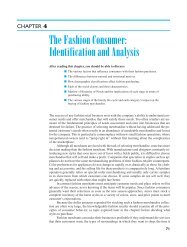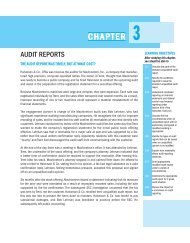Organizational Justice, Ethics, and Corporate Social Responsibility
Organizational Justice, Ethics, and Corporate Social Responsibility
Organizational Justice, Ethics, and Corporate Social Responsibility
Create successful ePaper yourself
Turn your PDF publications into a flip-book with our unique Google optimized e-Paper software.
CHAPTER 2 • ORGANIZATIONAL JUSTICE, ETHICS, AND CORPORATE SOCIAL RESPONSIBILITY 63<br />
ethical relativism<br />
The belief that no culture’s ethics<br />
are better than any other’s <strong>and</strong><br />
that there are no internationally<br />
acceptable st<strong>and</strong>ards of right <strong>and</strong><br />
wrong (the opposite of ethical<br />
imperialism).<br />
ethical imperialism<br />
The belief that the ethical<br />
st<strong>and</strong>ards of one’s own country<br />
should be imposed when doing<br />
business in other countries (the<br />
opposite of ethical relativism).<br />
Ethical Relativism: Nothing Is Sacred. To some, the matter of how to conduct oneself<br />
when doing business abroad is as easy as, “when in Rome, do what the Romans do.” This<br />
calls for adopting the ethics of whatever country in which one does business—an approach,<br />
known as ethical relativism. The rationale is that no culture’s ethics are better than any<br />
other’s, <strong>and</strong> that there are no internationally acceptable st<strong>and</strong>ards of right <strong>and</strong> wrong.<br />
The problem with this approach is that it may lead to condoning acts that violates<br />
one’s own sense of morality. 53 Consider this example. Some time ago, several European<br />
pharmaceutical companies <strong>and</strong> tanneries were looking for places where they could dispose<br />
of toxic chemical waste. Government officials from most countries they approached said<br />
no, fearing the health risks to their people. Nigeria, however, agreed to the business even<br />
though local workers, who didn’t have any protective clothing, had a good chance of coming<br />
into contact with deadly substances as they moved the barrels that contained them.<br />
Despite the fact that the practice was permitted in Nigeria, it’s easy to see how the risks to<br />
the workers make the practice ethically questionable.<br />
Ethical Imperialism: What Is Different May Be Wrong. Given that following<br />
ethical relativism may lead to moral transgressions, then how about the opposite approach?<br />
That is, what if, wherever they are, people use their own country’s ethical st<strong>and</strong>ards? In<br />
other words, they do everywhere whatever they consider to be right while at home. This<br />
approach, which is the opposite of ethical relativism, is known as ethical imperialism.<br />
It too has limitations. Highly absolute in its approach, ethical imperialism asserts that<br />
there is only a single set of rules regarding right <strong>and</strong> wrong—one’s own. Thus, whatever is<br />
different is wrong. Obviously, this is very limiting because it fails to recognize cultural <strong>and</strong><br />
situational differences that may influence ethical behavior. For example, North<br />
American–type training in avoiding sexual harassment (see Chapter 5) likely would be questioned<br />
in Middle Eastern countries, where the treatment of women is highly regulated by<br />
social <strong>and</strong> religious customs. Likewise, in parts of the world where people are dying from<br />
ETHICAL<br />
RELATIVISM<br />
''When in Rome..."<br />
No internationally<br />
acceptable st<strong>and</strong>ards of<br />
right <strong>and</strong> wrong<br />
GUIDING PRINCIPLES OF<br />
GLOBAL ETHICS<br />
Show respect for core human values.<br />
ETHICAL<br />
IMPERIALISM<br />
What is different may<br />
be considered wrong<br />
The ethical st<strong>and</strong>ards<br />
of one's own country<br />
are considered most<br />
appropriate<br />
Demonstrate sensitivity to local<br />
traditions.<br />
FIGURE 2.13<br />
Recognize that context matters when<br />
distinguishing between right <strong>and</strong><br />
wrong.<br />
Approaches to Global <strong>Ethics</strong>: Two Extremes <strong>and</strong> a Middle Ground<br />
Too often, people attempting to make ethical decisions in international settings follow one of the two<br />
ill-advised, extreme approaches identified here—ethical relativism <strong>and</strong> ethical imperialism. By<br />
adopting qualities of both approaches, a middle ground can be found in which people can be guided<br />
by three principles of global ethics.<br />
Source: Based on suggestions by Donaldson, 1996; see Note 53.

















